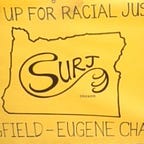Why Are So Many People Talking About Police Reform, or “Defunding The Police?”
This is the third article in a series focused on understanding the racist history of the police in Oregon.
Before answering this question, it’s important to understand what “defunding the police” means. Of course, different activists have different visions. However, for many activists, “defunding” the police is a term that refers to gradually reallocating funds away from the police department in order to create other parallel services aimed at addressing and preventing social issues that police currently often address, such as homelessness, addiction, mental health concerns, etc. We divest money from one organization in order to invest it in others.
Police reform does not necessarily mean that there won’t be a police force, or that an officer won’t come when you call. Instead, with other services created to address and prevent a range of common social issues, a police force could more narrowly respond to more typical crimes such as violence or theft.
So, why are so many people talking about police reform? This is in fact not a new discussion. Consider, for example, that early versions of what we now think of as “police” were created as slave patrols, using violence and the threat of violence to intimidate slaves into obedience. Or, that during Reconstruction, “many local sheriffs functioned in a way analogous to the earlier slave patrols, enforcing segregation and the disenfranchisement of freed slaves.” (Time) Consider that during the 19th century, “Fears of labor-union organizers and of large waves of Catholic, Irish, Italian, German, and Eastern European immigrants, who looked and acted differently from the people who had dominated cities before, drove the call for the preservation of law and order, or at least the version of it promoted by dominant interests.” Or, consider that in 1963, in the face of the brutal responses to peaceful demonstrations by many police forces across the country, Dr. Martin Luther King stated, “We can never be satisfied as long as the Negro is the victim of the unspeakable horrors of police brutality,” during his iconic “I Have A Dream” speech.
Police brutality is a concept that has remained relevant since this country’s inception. Like many other aspects of this country, your perception of the police likely depends on your daily experiences, your background, your ancestors’ historical experiences, and the pigment of your skin.
Perhaps the reason it seems like “so many people are talking about police reform” is because the voices of these communities are finally being heard after decades of crying out for change in vain.
So, before your defenses go up, before you unilaterally object to each and every call for reform, ask yourself — what has my personal experience been with the police? If your experience, similar to mine, has been overwhelmingly positive, then perhaps it is our time to listen to the experiences of people who have different backgrounds. If issues of police brutality seem foreign to your daily experiences, then perhaps the issue at hand is one we do not fully comprehend. In instances like this, we must lower our defenses, truly listen, and be open to change for the good of others.
Article authored by Tim, LTE/Messaging Committee
